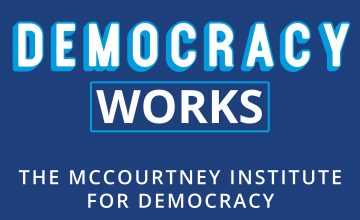Podcast: Play in new window | Download | Embed
Subscribe: Apple Podcasts | Spotify | Email | TuneIn | RSS | More

To say Brazil has had a complicated history with democracy is a understatement. The country has bounced in and out authoritarian regimes for hundreds of years, with democracy never having quite enough time to really take hold. Following the election of Jair Bolsonaro in October 2018, many are wondering whether the cycle is about to repeat itself again.
Gianpaolo Baiocchi is a professor of individualized studies and sociology at NYU, where he also directs the Urban Democracy Lab. He’s from Brazil and has written extensively about the country’s politics and social movements. He joins us this week to talk about Bolsonaro’s appeal, the use of misinformation on WhatsApp during the election, and why Bolsonaro is often called the “Trump of the tropics.” We also discuss Brazil’s history of activism under authoritarian governments and whether we’ll see it return now.
Next week is our final episode about democracy around the world. We’ll be talking with Penn State’s Sona Golder about all things Brexit.
Additional Information
Brazil’s unraveling political institutions – article by Gianpaolo in Democracy Journal
Discussion/Reflection Questions
- What is the role of social movements in Brazil?
- Do you think Brazil will retreat from democracy under Bolsonaro?
- What is the role of the military in Brazil?
- How is Brazil politically involved with other Latin American countries?
Interview Highlights
[3:07] What is the history of democracy in Brazil?
Brazil, a very unequal country, has had this relatively short and checkered history with democracy. Brazil was the last country to abolish slavery in the world. In 1964, Brazil had a military coup that lasted with a military regime that lasted until 1985. Social movements really played a very important role in the transition to democracy, but also in helping build the institutions of democracy. Brazil’s constitution of 1989 has some very progressive elements in it, has things about direct democracy, has gestures and participation municipalities, and have a lot of power.
[7:08] Where did social movements in Brazil come from?
Social movements comes in the mid-1980s. There are urban movements, the movement for the right transport, the movement against poverty, student movements, a lot of movements to the progressive church, so kind of Liberation theology, we have movements very important of patients and users of the health system.
[10:38] Who is Jair Bolsonaro and why was he appealing?
People are going to be talking about the Bolsonaro phenomenon for a long time. He’s been a politician for a long time and he’s mostly known for shocking statements. He’s been a guy who likes to say provocative things about rape, about affirmative action, and sort of anti-political correctness. His platform is law and order, it’s about God, it’s against political correctness, and it’s pro-business. He definitely has the elite support in Brazil, but because Brazil is an unequal country, that won’t go very far.
[16:18] Why is Bolsonaro compared to Donald Trump?
There are definitely similarities between Trump’s Make America Great Again rhetoric and some of Bolsonaro’s language. They’re both populists and have both been involved in scandals, yet always seem to skate by and remain in power. Trump and Bolsonaro have also sought to undermine democratic institutions. However, the institutions in Brazil were weaker to begin with because democracy does not have the long history there that it does in the U.S.
[19:05] Can you give us some examples of how institutions in Brazil are weaker?
The judicial system, the courts begun to play a very openly political role. The Minister of Justice was the judge and prosecutor over Lula, the former president of Brazil, who’s currently under arrest and during the process of the prosecution investigation. This judge was very openly partisan in social media and releasing things and it has given people the sense that the law is just something that you use. One of the things that has happened because of Bolsonaro being elected is that people has a free license to commit hate crimes. The only openly gay member of Brazilian Congress has had to flee the country.
[23:02] Did misinformation play a role in Bolsonaro’s election?
Yes. Social media and fake news were a huge part of the election. In particular, a WhatsApp investigation a few days before the election itself revealed that foreign money and industrialists had paid for all these bots to repeat these fake news.
[24:49] How is Bolsonaro playing throughout the rest of Latin America?
The balance of the continent has definitely shifted. All eyes are in Venezuela right now and early on in his campaign. Bolsonaro said he would be for a military intervention and I don’t think that’s actually going to happen, but Bolsonaro’s election does feel like the region has definitely turn right and turned authoritarian in a very real way.
[28:44] Social movements have risen up before in Brazil. Do you see the same thing happening again now or in the future?
Yes! In the weeks before the election as it look like Bolsonaro was really going to win, people came together in a way that hadn’t really been seen in a long time in Brazil.







 We’ll be back with new episodes starting next week. This week’s episode comes to you from our friends at
We’ll be back with new episodes starting next week. This week’s episode comes to you from our friends at 




















